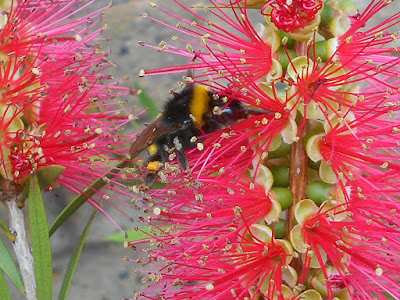It is - or appears to be - Callistemon citrinus, my slight niggle of doubt due to the fact that the leaves, when rubbed, have no citrous smell. But I am fairly sure that it had a mild smell of tangerines last year. Odd.
The bright crimson 'brushes' are being borne in more profusion this year. There are about eighteen of them, but every time I count them I arrive at a different number!
Despite the ever-warming climate I am growing my plant against a warm south-west facing wall where it seems very happy. I can't quite match the conditions of its Australian home but on parts of Britain's south coast the plant really flourishes.
 |
Our plant is now bearing plenty of bottle brushes. Stefen Hill, Daventry.
30 June, 2019
|
In Australia Callistemon citrinus reaches genuine tree proportions. I'm not sure whether any British plants can really match this but on, say the Isle of Wight or around Torquay, bottlebrush trees wouldn't surprise me.
 |
This photograph by Robert Perry and lifted from the internet shows the
potential of bottlebrush trees.
|
 |
| The brushes look, and of course are, exotic. |
The very long stamens (Callistemon means 'beautiful stamens') must be problematic for bees. I had thought that perhaps they were just collecting the pollen but the following shot seems to show a tongue probing for nectar.
 |
As I took this pictures three other bees were busy at work on the plant.
Stefen Hill, Daventry. 2 July, 2019
|
The shrub can be faulted in that it has a sprawling, ungainly look about it, but I am sure a few judiciously-placed supports would sort the matter.
No comments:
Post a Comment